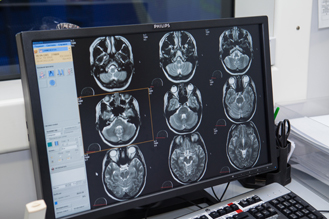MRI of the cerebral vessels

Magnetic Resonance Imaging (MRI) of the cerebral vessels is a non-invasive diagnostics for the purpose of blood circulation visualization to the area of brain and neck. The procedure is aimed at preventing a developmental disorder, as well as at detection of the following congenital or acquired pathologies:
- cavernoma;
- aneurysm;
- intracerebral hematoma;
- chronic ischemia;
- posterior artery syndrome;
- intracranial hypotension;
- infarction of the cerebral artery.
At the department of radiology in JSC «Medicina» Clinic (Professor Roytberg Clinic) MRI of the brain is conducted on the apparatus with a power of 3 Tesla. It allows to obtain clear images in any projection and identify the diseases in the early stages.
Pricelist
| Name of the service | Prices(rub.) |
| Magnetic Resonance Angiogram of the intracranial vessels | 20 800 |
| Magnetic Resonance Imaging of the brain with contrast during multiple sclerosis | 37 900 |
| Magnetic Resonance Imaging of the brain with contrast during neurovascular conflict | 34 800 |
| Magnetic Resonance Angiogram of the cerebral vessels | 22 600 |
| Magnetic Resonance Angiogram of the sagittal sinus of the brain | 19 900 |
Indications and contraindications
MRI of the cerebral vessels is carried out for diagnosing the diseases of the large arteries and small vessels in the following cases:
- trauma to the head, neck or spine;
- recurring migraines;
- dizziness and loss of consciousness for no apparent reason;
- arterial pressure differentials;
- sudden impairment of sight or hearing;
- memory decline;
- absent-mindedness and confusion;
Also, the procedure is conducted in preparation for a surgical intervention or assessing the efficiency of the assigned therapy. For improving the quality of the images during the MRI of the cerebral vessels, the contrast based on iodine is used. The medication enables the doctor to identify the narrowing or obstruction of the veins without the operation, and also to understand where the implants need to be placed (for example, stent).
MRI has a series of contraindications:
- metal elements in the body:
- pregnancy and breastfeeding;
- intolerance to the medications with iodine;
- inability to keep calm during the procedure;
- claustrophobia;
- kidney failure.
During the conversation with a doctor tell him about the specificities of your organism. It will help the specialist to choose a safe way of examination.
To sign up for the MRI of the cerebral vessels call the JSC «Medicina» Clinic (Professor Roytberg Clinic) to a number in Moscow: +7(495) 775-73-60.
Doctors







